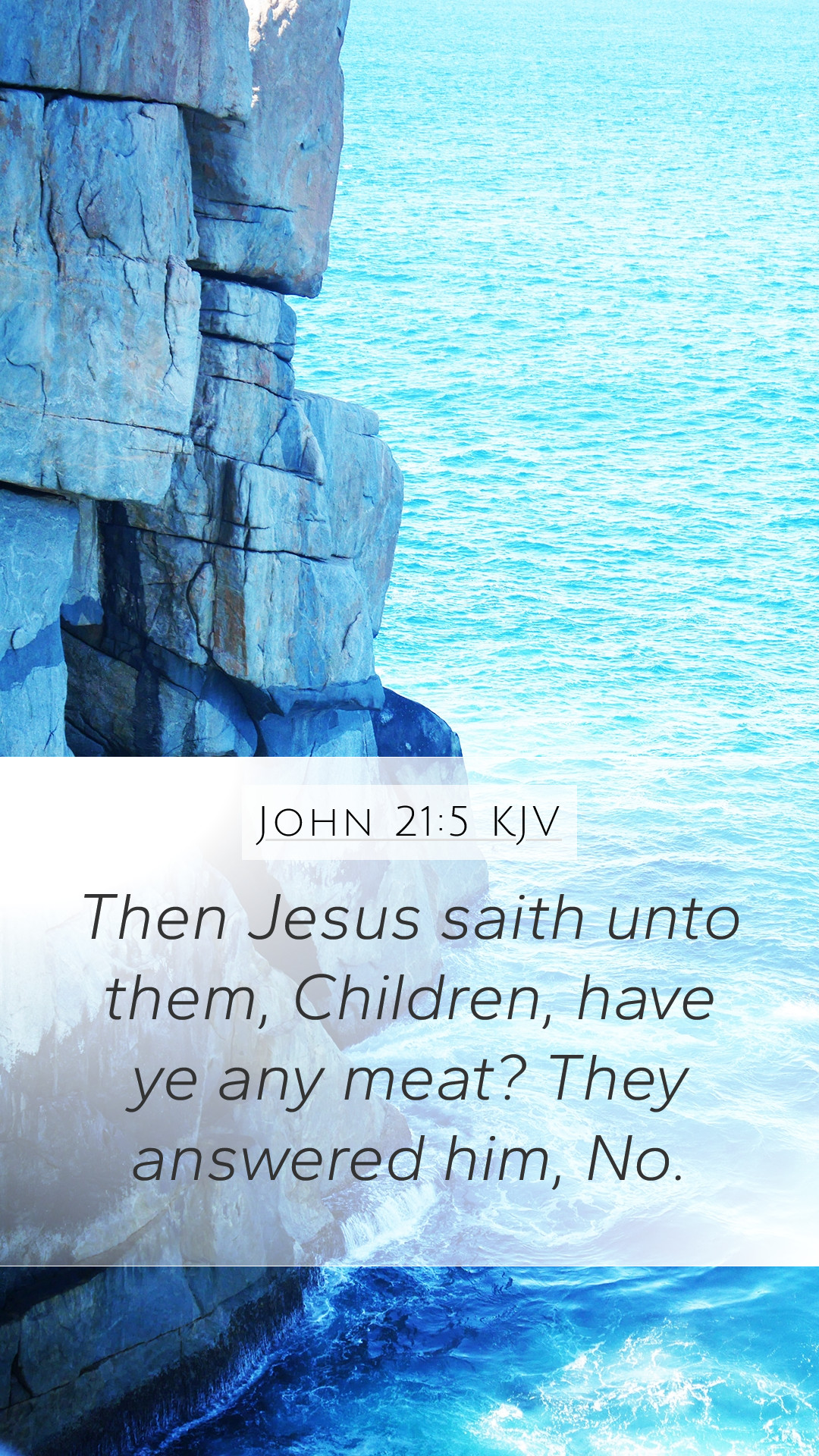Old Testament
Genesis Exodus Leviticus Numbers Deuteronomy Joshua Judges Ruth 1 Samuel 2 Samuel 1 Kings 2 Kings 1 Chronicles 2 Chronicles Ezra Nehemiah Esther Job Psalms Proverbs Ecclesiastes Song of Solomon Isaiah Jeremiah Lamentations Ezekiel Daniel Hosea Joel Amos Obadiah Jonah Micah Nahum Habakkuk Zephaniah Haggai Zechariah MalachiJohn 21:5 Meaning
What is the meaning of John 21:5?
Then Jesus saith unto them, Children, have ye any meat? They answered him, No.
John 21:5 Bible Verse Meaning
Meaning and Commentary on John 21:5
John 21:5 states: "Then Jesus said to them, 'Children, do you have any fish?' They answered him, 'No.'" This verse falls within the context of the final chapter of the Gospel of John, where the resurrected Jesus appears to His disciples by the Sea of Tiberias. The interaction captures an important moment of realization and instruction. This commentary synthesizes insights from respected public domain scholars, including Matthew Henry, Albert Barnes, and Adam Clarke.
Contextual Background
This verse takes place after Jesus’ resurrection, indicating His continued involvement in the lives of His disciples. The disciples, returning to their old profession of fishing, symbolize the uncertainty they felt after Jesus' crucifixion. This return is significant as it reflects the confusion and possible despair they experienced. They had not yet fully grasped the implications of Jesus' resurrection and His calls to a new kind of discipleship.
Verse Significance
The term "children" used by Jesus is affectionate and serves to reestablish the relationship between Him and the disciples. It denotes a sense of care and concern from Jesus. The question about fish serves multiple purposes:
- Physical Need: The disciples had been fishing all night without success, which highlights their struggle during a time of uncertainty.
- Spiritual Implication: Jesus prompts them to examine their efforts and realize their reliance on Him for true sustenance and success.
Interpretational Insights
Matthew Henry notes that Jesus’ inquiry about their catch signifies His awareness of their situation, mirroring how God perceives the struggles of His followers. This interaction demonstrates that even in our endeavors, without Christ's blessing and guidance, our efforts are often in vain.
Albert Barnes emphasizes the importance of Christ’s question. It shows He is concerned with our daily lives as well as our spiritual state. The disciples’ response, "No," signifies a need for help and the acknowledgment of failure, setting the stage for Jesus' subsequent miracle where He instructs them to cast their net on the right side of the boat.
Adam Clarke adds that the use of "children" signifies that Jesus continually relates to His followers with love and authority, invoking submission and a reminder of their identity in Him. The question itself directs the disciples to reflect on their current spiritual barrenness before bringing them into a teaching moment that leads to abundance, both spiritually and materially.
Application to Daily Life
This verse calls readers today to consider their reliance on Christ in everyday circumstances. Often, we pursue our plans and ambitions without seeking His guidance, leading to feelings of frustration or failure. By recognizing our shortcomings, as the disciples did, we open ourselves to Jesus’ provision and direction.
Related Cross References
- Luke 5:4-6 – The miraculous catch of fish at the beginning of Jesus’ ministry.
- Matthew 4:19 – Jesus calling the disciples to be fishers of men.
- John 15:5 – "I am the vine; you are the branches..." emphasizing reliance on Christ.
Conclusion
John 21:5 encapsulates a significant interaction between Jesus and His disciples, imparting lessons about dependency, awareness of one's spiritual state, and the inviting nature of Christ's call. The understanding of this verse is not merely academic; it serves as a guide for personal reflection and growth in faith.


